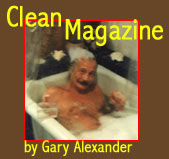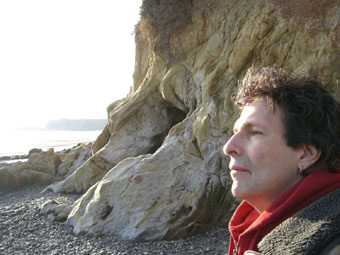 Charles Lyonhart
Charles Lyonhart
The "Back From the Dead" Concert
Charles Lyonhart at the
Colony Cafe
Saturday, March 31
Story by Gary Alexander
Photography by Eeo Stubblefield
The
skull that frowned back from the mirror seemed to have leaked away
all of its animating hope...It was over. He could see it in the
shadows cast across his face by an nearby window. It was done.
"I looked in the mirror every morning and saw myself dying more and
more," singer-songwriter
Charles Lyonhart
recalls. "I was a ghost.
After a while I just saw a skeleton standing there because my face
started to sink in and I was getting jaundiced. I wore a lot of
make-up just to go out because I was embarrassed at how bad I looked."
Going out was an occasion which occurred infrequently in those months
of twilight existence as Lyonhart fought for scraps of energy. He
describes awakening after a night’s sleep and becoming overwhelmed by
a need to return to bed after struggling to shower and dress. But the
performer will be out and about on Saturday, March 31st when he brings
a revitalized presence to
The Colony
stage in Woodstock with his first
full performance since a life-saving surgery renewed his energies and
his outlook.
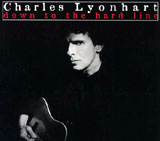 Having managed to complete an album called Down to the Hard
Line with his waning, nearly depleted energies in 2005, Lyonhart
expresses a deep resource of gratitude for the friends who had seen
him through the project, including stellar guitarist Larry Campbell,
who contributed luminous lines of notes to highlight the singer’s
melodies between his travels as part of Bob Dylan’s touring band.
Also instrumental in the album’s construction, if you’ll forgive the
pun, was ace keyboard player Lincoln Scheifer, who’ll be on hand for
the "Back From the Dead" concert along with Julie Last and Brian
Hollander, famed fiddler Fooch, Jeff Streichert and Mimi Paturel.
Having managed to complete an album called Down to the Hard
Line with his waning, nearly depleted energies in 2005, Lyonhart
expresses a deep resource of gratitude for the friends who had seen
him through the project, including stellar guitarist Larry Campbell,
who contributed luminous lines of notes to highlight the singer’s
melodies between his travels as part of Bob Dylan’s touring band.
Also instrumental in the album’s construction, if you’ll forgive the
pun, was ace keyboard player Lincoln Scheifer, who’ll be on hand for
the "Back From the Dead" concert along with Julie Last and Brian
Hollander, famed fiddler Fooch, Jeff Streichert and Mimi Paturel.
"Hard Line" had followed two solid collections of Lyonhart tunes-
Exception To the Rule and Leap of Faith which featured
rousing rockers like "Senorita, Dance" and haunting ballads like "Arms
of Sweet Helena," which chillingly harkens back to a decade and a half
of addiction to heroin and methadone, an obstacle which forestalled
his musical career until he managed to slip out of those seductive
"arms" in the 1990's.
The legacy of those lost years were not through with him, however, and
the dehabilitating effects of a Hepatitis "C"viral infection
increasingly sapped his strength that year as he suffered the loss of
his close friends and fellow singer-songwriters
Mindy Jostyn to cancer
and, months later,
John Herald, whose suicide in July of 2005 jolted
the music world. Lyonhart, who traveled to Woodstock each week as
part of the "Tuesday Night Committee" which organized a grand tribute
to John at the Bearsville Theater, felt himself fading fast and became
convinced by the unwritten "Law of Threes" that he was next on the
funeral list.
In October of 2005, Charles had the medical tests which confirmed his
fears by revealing that he had liver cancer.
"That was a death sentence," Lyonhart said. "They told me, in
essence, that they could give me blood pressure medication to help
keep me from bleeding to death internally but, other than having a
transplant, I was going to die...And I made peace with that. After
all those years of living on the edge as I did, I believed that was
the price I had to pay for the life I had lived during those decades.
As sad as I was, I came to terms with it. I had done this to myself
and there was no one else to blame. I had my will made up and said
goodbye to all my friends."
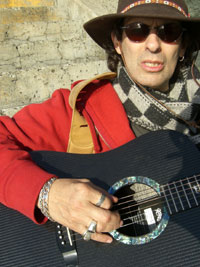 When Lyonhart broke the news to his friend Larry Campbell, showing him
the x-rays, he was stunned when the guitarist smiled.
When Lyonhart broke the news to his friend Larry Campbell, showing him
the x-rays, he was stunned when the guitarist smiled.
"This is liver cancer, Larry, what are you smiling for?" Lyonhart
asked incredulously. "But he had known about transplants because he
had worked with (former Grateful Dead musician) Phil Lesh, who had a
liver transplant and his good friend Butch Denner, who managed The
Band, also had one. So, he said this was absolutely a good
thing because if I had cancer, I would go to the top of the (organ
recipient) list and, if everything went right, I’d be ‘swinging by
Spring’."
"I thought he was out of his mind at the time but he was right about
the donor list," Lyonhart conceded. Put on the UNOS (United Network
of Organ Sharing) list in November, he received a call on Christmas
day to report to the hospital immediately because they had just
received an organ for him. He later learned that the tumors would
have killed him by January or February if the liver had not been
removed.
Infecting an estimated 150 to 200 million people worldwide, Hepatitis
C is spread by intravenous drug use, tattoos, "unsafe" sex and other
means. Not uncommonly it leads to cirrhosis and/or liver cancer.
Lyonhart didn’t learn that the survival rates for transplants of the
body’s largest solid organ were only 50 to 60% until the last moment
but, by then his mind had been made up during a meeting with Phil Lesh
(who now has a
Hepatitis C page
at his website).
 Any lingering doubts were dispelled when Lesh told him that he had
lived to see his kids grow up because of the operation and asked
Lyonhart if he also wanted to see his kids grow up. When Charles
responded "Of course," Lesh, looking in the prime of health, said
"Then don’t even think about it- get the transplant!"
Any lingering doubts were dispelled when Lesh told him that he had
lived to see his kids grow up because of the operation and asked
Lyonhart if he also wanted to see his kids grow up. When Charles
responded "Of course," Lesh, looking in the prime of health, said
"Then don’t even think about it- get the transplant!"
"What choice was there?" Lyonhart pondered, reflecting on the
pre-surgical eternity he laid on his couch day after day, rising only
for brief trips to the bathroom or kitchen. "When you have liver
disease, you can’t do anything. You have no energy, no ambition.
You’re just frozen in suspension, waiting to die, wanting it, watching
the world go on around you."
Lyonhart was out of the hospital by New Year’s Eve but it would be a
long time before he could even hold a guitar much less play one and
sing. Singing would take months of recovery to achieve. Deep
breathing was painful enough between gulps of painkillers, steroids,
the essential anti-rejection drug Prograf and other medications he was
required to consume.
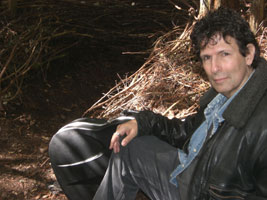 "The irony is that, having fought for so many years to get off junk so
that I wouldn’t have to take something every day just to stay
straight, now I have to take this stuff daily to fight off rejection,"
he sighed, acknowledging himself fortunate to have had the medical
insurance to help pay for the vastly expensive surgery and continuing
pharmaceutical therapy. He laments the loss of another friend last
year to liver disease simply because he lacked the insurance he needed
for a chance to stay alive. Lyonhart also found his previous
experience in kicking drugs helpful to ease off of the painkillers
once they were no longer needed. And, he is quick to add, he was
fortunate to have the music to keep him going through darker moments.
"The irony is that, having fought for so many years to get off junk so
that I wouldn’t have to take something every day just to stay
straight, now I have to take this stuff daily to fight off rejection,"
he sighed, acknowledging himself fortunate to have had the medical
insurance to help pay for the vastly expensive surgery and continuing
pharmaceutical therapy. He laments the loss of another friend last
year to liver disease simply because he lacked the insurance he needed
for a chance to stay alive. Lyonhart also found his previous
experience in kicking drugs helpful to ease off of the painkillers
once they were no longer needed. And, he is quick to add, he was
fortunate to have the music to keep him going through darker moments.
When you look at Charles Lyonhart today, you can see traces of the
medical miracle glowing from his edges. He appears healthier than at
any time in recent memory and seems to stay happily busy morning to
night, speaking with a trace of awe about difficult-to-define changes
he has noticed in himself.
"I’m not the same person I was in some ways," he notes. "With a
transplant, you’re not just getting a functioning liver, you’re
getting a lot of DNA and the liver controls so much of what else goes
on in the body. I know I’ve changed a lot in the way I view things.
I’m not saying that in a bad way but the way I view time and spend it
with people is different. Coming that close to death brings
realizations about the things that are really important in life- your
friends, your family. Everything else is bullshit. You can’t buy
back your daughter if she goes over to Baghdad and gets killed. All
of this has refreshed my value system."
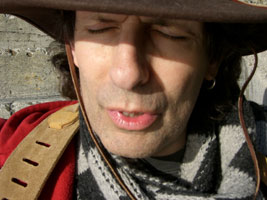 Although he has "sat in" as a guest on a few gigs recently, Saturday
night’s show will be Lyonhart’s first opportunity to fully display the
enhanced guitar playing ability he developed during his recovery
period and to air new songs written for an upcoming album called
Maverick Road in honor of John Herald, who lived and died in
his little cabin on Maverick Road. One of the songs, "Outside,
Looking In," reflects on the tragedies of that year of upheaval in his
life and contains the refrain "They say the road goes on forever but
they’re wrong." But, in Lyonhart’s case, it goes on for now with fewer
clouds overhead.
Although he has "sat in" as a guest on a few gigs recently, Saturday
night’s show will be Lyonhart’s first opportunity to fully display the
enhanced guitar playing ability he developed during his recovery
period and to air new songs written for an upcoming album called
Maverick Road in honor of John Herald, who lived and died in
his little cabin on Maverick Road. One of the songs, "Outside,
Looking In," reflects on the tragedies of that year of upheaval in his
life and contains the refrain "They say the road goes on forever but
they’re wrong." But, in Lyonhart’s case, it goes on for now with fewer
clouds overhead.
|
-Gary Alexander
Gary Alexander
is an independent journalist and scholar whose focus of
interests range through a variety of disciplines. Under various names,
he has written (and ghost written) upon history and current event;
science and technology, as well as music and the arts in books and for
national periodicals. While particularly attentive to the subtle and
complex impact upon cultural imagination and contemporary structures of
presumption which activity in the above mentioned topics tend to have,
Alexander treats his topics with a slightly more than occasional resort
to humor.
Posted on March 31, 2007
|
